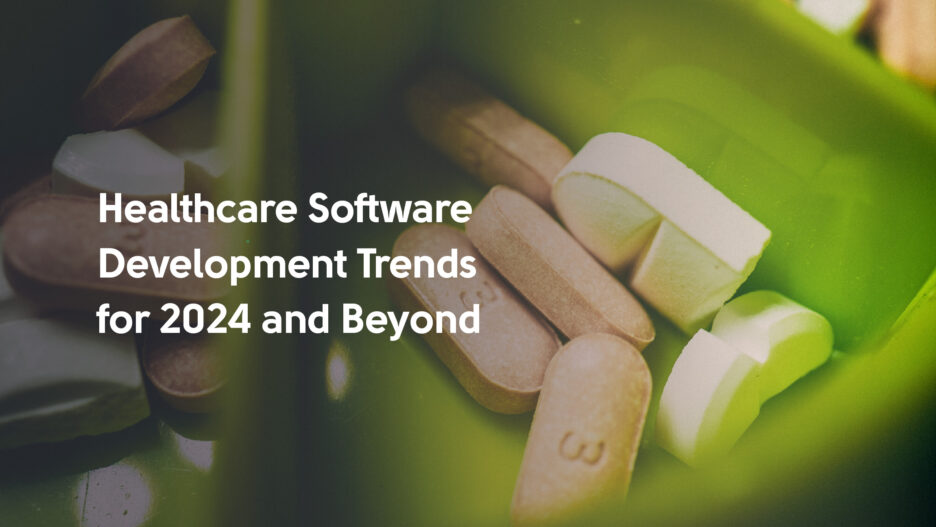As the healthcare industry continues to evolve at a rapid pace, the role of technology in shaping patient care and medical operations becomes increasingly significant.
This article aims to provide a rich overview of the healthcare software development trends for 2026 and beyond.
Join us in exploring these healthcare software development trends shaping healthcare technology's future and are instrumental in forging a more efficient, accessible, and personalized healthcare system.
1. Telemedicine and Remote Patient Monitoring
Telemedicine and remote patient monitoring continue revolutionizing healthcare delivery, especially as we head into 2026. With the increasing adoption of telehealth platforms, patients can access medical care from the comfort of their homes.
This trend is not just about convenience; it's critical in managing chronic diseases, reducing hospital readmission rates, and improving patient outcomes. Advanced technologies like wearable health devices and mobile health apps enable continuous monitoring of vital health parameters, facilitating proactive care and early intervention.
Remote patient monitoring systems are also evolving, integrating AI and machine learning to provide more precise and predictive analysis of patient data. This shift improves patient care and reduces the workload on healthcare professionals, allowing them to focus on more critical cases.
2. Interoperability and Health Information Exchange
Interoperability and health information exchange are key to the seamless operation of healthcare systems. In 2026, these healthcare software development trends will focus on creating a unified system where patient data from various sources can be easily and securely accessed and shared. The goal is to enhance coordination and communication among healthcare providers, leading to more efficient and effective patient care.
As health records become increasingly digitized, integrating and analyzing data from various sources becomes crucial. This integration gives healthcare professionals a more comprehensive view of a patient's health history, ensuring better-informed decision-making and personalized care.
3. Data Analytics and Population Health Management
Data analytics transforms healthcare into a more proactive, predictive industry. In 2026, we can expect significant advancements in how data is used for population health management. By analyzing large sets of health data, healthcare providers can identify trends, predict outbreaks, and allocate resources more effectively.
This trend also encompasses using predictive analytics to identify at-risk populations and intervene before health issues escalate. The focus will be on preventive care, driven by data analytics insights, leading to better health outcomes and reduced healthcare costs.
4. Internet of Medical Things (IoMT)
The Internet of Medical Things (IoMT) is set to be a game-changer in the healthcare industry. By 2026, more medical devices will be connected to the internet, collecting and transmitting valuable health data. This trend is not just about data collection; it's about creating an ecosystem of interconnected devices that can communicate with each other, providing more comprehensive and real-time insights into patient health.
IoMT will enable more personalized and timely medical interventions, improving patient outcomes. It also promises to streamline healthcare operations, reducing errors, and enhancing patient safety.
5. Genomics Tools
The integration of genomics tools into healthcare software development is rapidly advancing, as illustrated by the Thermofischer case study on their Genomics Analysis App. This case study showcases how Svitla helped the client migrate from a legacy architecture to a modern tech stack, including WPF, ASP.NET Core, Angular, and MS SQL. By leveraging Svitla's software engineering expertise to re-architect the client’s genomic analysis app, the biotech company was able to scale quickly to meet demands from research institutions for advanced genomics capabilities.
By 2026, such applications will allow for more advanced, quicker, and cost-effective analysis of genetic information. These tools enable personalized treatment plans based on an individual's genetic makeup, opening doors to new realms in precision medicine and tailored therapies.
6. Personalized Medicine and Patient Engagement
Personalized medicine and patient engagement are closely intertwined in healthcare software development trends, reshaping the healthcare landscape. By 2026, we'll see an increased emphasis on developing treatments and care plans tailored to individual patients based on their genetic makeup, lifestyle, and health history.
This trend also encompasses the role of patients in their healthcare journey. With more access to their health information and a greater understanding of their health conditions, patients are becoming more involved in their care decisions. This shift towards patient-centered care empowers patients and leads to more effective and satisfactory healthcare outcomes.
7. Blockchain Technology in HealthTech
Blockchain technology is poised to revolutionize the healthcare industry, pushing the boundaries of healthcare with its promise of enhanced security and efficiency. Its application in healthcare extends to increasing supply chain transparency and securing online financial operations. The rise in blockchain-related healthcare applications signifies the industry's recognition of this technology as a primary driver of innovation.
One of the most significant advantages of blockchain in healthcare is its potential to save billions of dollars in the coming years. This cost optimization is projected across various sectors, including software development, operations, personnel, and, most notably, mitigating health data breaches. Blockchain's immutable and decentralized nature makes it ideal for handling sensitive medical data, ensuring integrity and traceability.
As we move into 2026 and beyond, forward-thinking organizations increasingly adopt blockchain to facilitate future-proof, data-driven, and patient-centric solutions. The technology enhances operational efficiency and builds trust and transparency within the healthcare ecosystem.
8. Artificial Intelligence (AI) in healthcare
AI's role in healthcare is multifaceted. It is instrumental in remote patient treatment, streamlining the process of developing new drugs and enhancing the accuracy of diagnoses. This technological advancement is changing the dynamics between patients and healthcare providers, offering more efficient and effective care solutions.
In the field of diagnostics, AI is revolutionizing oncology. AI-driven analysis aids early cancer detection, enabling the development of mobile apps that assess cancer risks and detect the disease much earlier than traditional methods. This quick and precise diagnostic capability, coupled with the optimization of anti-cancer drug combinations, illustrates how AI is technically saving lives by improving patient outcomes.
As we look towards the future, AI's role in healthcare will only increase, providing deeper insights into care processes, treatment variability, and patient outcomes. Its ability to augment human expertise makes AI, not just a technological tool but a transformative force in healthcare.
Shaping a Healthier Future: The Transformative Impact of Healthcare Software Development Trends
As we've explored, the healthcare software development trends for 2026 will fundamentally reshape healthcare's future. These advancements are not merely technological feats; they represent a paradigm shift in patient care, healthcare accessibility, and industry efficiency. From AI-driven diagnostics to blockchain-enhanced security, each trend is a stepping stone towards a more integrated, responsive, and patient-centric healthcare system.
For providers, these healthcare software development trends signify an era of enhanced capabilities and greater precision in treatment. For patients, they promise more personalized care, improved outcomes, and greater empowerment in managing their health. As we look to the future, the continuous evolution of healthcare technology holds immense innovation potential, further revolutionizing how healthcare is delivered and experienced.
Svitla Systems is a valuable partner in this evolutionary journey, offering expertise and innovative solutions that align with these healthcare software development trends. Svitla Systems is a key contributor to the ongoing transformation and potential of the healthcare industry, paving the way toward a new era, one where technology supports health and actively shapes a more informed world.





